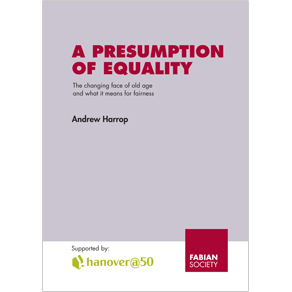A Presumption of Equality: The changing face of old age and what it means for fairness
Politicians should adopt a ‘presumption of equality’ between age groups. Policies should not be designed on the assumption that age is a good proxy for low income; instead older people should only receive special treatment when there is a clear rationale and evidence.

- A Presumption of Equality
- Andrew Harrop
- 11 July 2013
This report looks at mid-income older people, a group who have been overlooked in political and media debates about later life. Perspectives on ageing are dominated by how people think about the ‘top’ and the ‘bottom’. There are two competing narratives of later life: wealthy baby-boomers versus pensioners on the breadline facing poverty, isolation and ill-health. The truth is that the majority of older people today are somewhere in between – neither rich nor poor – and the middle is expanding as a result of recent successes in reducing pensioner poverty.
This report argues that government should adopt a ‘presumption of equality’ when considering public policy for different age groups. There is a legitimate worry that older people have not been sharing sufficiently in the pain of current deficit reduction. All policies which appear to give special advantages to older people as a category should be reviewed, because in financial terms alone, older people are no longer special. That does not mean scrapping all age-based variations, and this report demonstrates the vital place of a strong state pension system for middle income groups. But it does mean assessing the evidence and rationale for existing rules on social security, taxation and the design of services.
With this in mind there may be a case for cutting some public spending: means-testing the winter fuel payment is one ‘least bad’ option, though the savings would be comparatively modest. But there is a much stronger case for increasing taxes on older people to bring them into line with other households, with serious consideration paid to the gradual integration of national insurance and income, as part of a ‘grand bargain’ with the extra revenue earmarked for social care and the NHS.
Author
Fabian membership
Join the Fabian Society today and help shape the future of the left
You’ll receive the quarterly Fabian Review and at least four reports or pamphlets each year sent to your door
Be a part of the debate at Fabian conferences and events and join one of our network of local Fabian societies
Join the Fabian SocietyBe the first to know
Sign up to the free Fabian Society newsletter
Find out about the latest Fabian Society research, publications and events with our regular updates
Sign up today